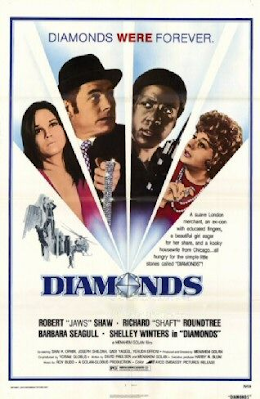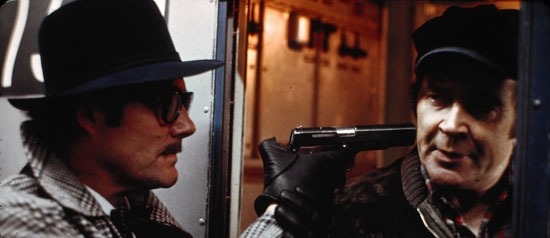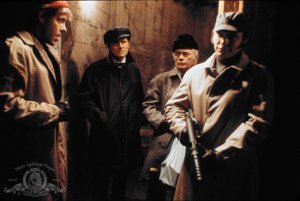The Black Stallion
 This is one of the most beautiful films you ever saw. The cinematography by Caleb Daschanel is entrancing, both the sections set on a Mediterranean Island and those taking place in middle America in the 1940s. I think the phrase "magic hour" might have been invented to describe much of the work here. Amanda had never seen this film. I bought a copy on DVD for the girls when they were younger but they never got around to watching it before they were off to college, so I guess it is my fault for not forcing it down their throats.
This is one of the most beautiful films you ever saw. The cinematography by Caleb Daschanel is entrancing, both the sections set on a Mediterranean Island and those taking place in middle America in the 1940s. I think the phrase "magic hour" might have been invented to describe much of the work here. Amanda had never seen this film. I bought a copy on DVD for the girls when they were younger but they never got around to watching it before they were off to college, so I guess it is my fault for not forcing it down their throats.We are suckers for animal stories around here. we have had dogs and cats and snakes and rats and assorted amphibians and rodents as members of the household . We have never however had a horse. I have a cousin who has devoted large parts of her life to horses and after seeing movies like this, you can easily understand how this could happen. "The Black" as he comes to be known, has a magnetic effect on the young boy Alec, who is the star of the movie. Our screening was hosted by film critic and historian Leonard Maltin. He noted that Kelly Reno, who played young Alec was basically just a ranh kid who could ride from the time he was very young. He has to carry a lot of the film and it is a very good child performance.
Maltin was joined by co-screenwriter Jeanne Rosenberg, who was fresh out of film school at USC when she happened into the gig. Originally she connected with the director as a production assistant just based on a phone call when she heard that Carroll Ballard was going to make a movie of her favorite childhood book. The screenplay was not something the first time director had nailed down and it was still being revised by Melissa Matheson. As the production geared up, Rosenberg worked with Matheson to fashion the story into a screenplay and get so many things right.
The first half of the movie is a magical story of the boy and the horse coming together and saving each other after a maritime disaster. Hoyt Axton plays Alec's dad, a man who is lucky at cards but maybe not at much else as we see. He played a similar type of character a few years later in "Gremlins". The shipwright and beach sequences are the most memorable scenes in the film and they just look gorgeous. When the story shifts back to the small town setting for the final half, two new adult characters become part of the story. Terri Garr who is always so welcome is Alec's long suffering mother. It's Mickey Rooney however who comes closest to stealing the film from the horse. As a retired race horse trainer, who is struggling with his farm and separation from the racing life, Rooney comes across as a sincere and interesting mentor to Alec. He was nominated for Supporting actor that year, and that performance probably lead to the Honorary Oscar he deservedly received three years later.
The Taking of Pelham One Two Three
 One of our favorite films of all times was playing in the same Egyptian Theater right after "The Black Stallion", so we went right out the door for one and got back in line for the next. I did a write up for "The Taking of Pelham One Two Three" for a Robert Shaw Film Festival that I did on the web site seven years ago, you can read the original post here. I also wrote about the film for a series I contributed to on the now defunct Fog's Movie Reviews. I have been slowly re-posting those reviews on this site under my series "Movies I Want Everyone to See". As soon as this post goes up, I will add the Pelham post to the blog and you can read about it in more depth.
One of our favorite films of all times was playing in the same Egyptian Theater right after "The Black Stallion", so we went right out the door for one and got back in line for the next. I did a write up for "The Taking of Pelham One Two Three" for a Robert Shaw Film Festival that I did on the web site seven years ago, you can read the original post here. I also wrote about the film for a series I contributed to on the now defunct Fog's Movie Reviews. I have been slowly re-posting those reviews on this site under my series "Movies I Want Everyone to See". As soon as this post goes up, I will add the Pelham post to the blog and you can read about it in more depth. This screening need to be special because we passed up the showing of "The Ten Commandments" hosted by Ben Burt and Craig Barron. Their presentations have been the highlights of each of my previous Film Festival experiences and the Special Effects and Set Design are the best things about the Ten Commandments. I sure hope their presentation ends up on TCM Backlot so I can enjoy it. Anyway, it turns out that we made a good choice because the movie was preceded by a most insightful presentation by Bruce Goldstein, who among other things is the director of Repertory Programming at the New York Film Forum.
This screening need to be special because we passed up the showing of "The Ten Commandments" hosted by Ben Burt and Craig Barron. Their presentations have been the highlights of each of my previous Film Festival experiences and the Special Effects and Set Design are the best things about the Ten Commandments. I sure hope their presentation ends up on TCM Backlot so I can enjoy it. Anyway, it turns out that we made a good choice because the movie was preceded by a most insightful presentation by Bruce Goldstein, who among other things is the director of Repertory Programming at the New York Film Forum. Goldstein's talk was punctuated with historical references to NYC in the 1970s and also an extensive review of the use of the New York subway system as a film location. There were clips from "Death Wish', "The Incident", "The Warriors" and even Michael Jackson's "Bad" which was shot by Martin Scorsese in some of the same spots. The best clip however was the video of former Mayor of NYC Ed Koch, introducing the film at a 1991 Film Forum event. Actor Lee Wallace plays the Mayor of NY in Pelham, and he bears an astonishing resemblance to Koch, who became the mayor much later. People often thought the film Mayor was modeled after Koch but the film preceded Koch's term by 4 years. Wallace would also play the Mayor of Gotham City in Tim Burton's "Batman", almost certainly this time inspired by Koch. Goldstein says that "The Taking of Pelham One Two Three" is the one film that gets New York Geography absolutely right. We got a little travelogue of the subway system as part of his talk as well.
Goldstein's talk was punctuated with historical references to NYC in the 1970s and also an extensive review of the use of the New York subway system as a film location. There were clips from "Death Wish', "The Incident", "The Warriors" and even Michael Jackson's "Bad" which was shot by Martin Scorsese in some of the same spots. The best clip however was the video of former Mayor of NYC Ed Koch, introducing the film at a 1991 Film Forum event. Actor Lee Wallace plays the Mayor of NY in Pelham, and he bears an astonishing resemblance to Koch, who became the mayor much later. People often thought the film Mayor was modeled after Koch but the film preceded Koch's term by 4 years. Wallace would also play the Mayor of Gotham City in Tim Burton's "Batman", almost certainly this time inspired by Koch. Goldstein says that "The Taking of Pelham One Two Three" is the one film that gets New York Geography absolutely right. We got a little travelogue of the subway system as part of his talk as well.The soundtrack of this film is terrific and it is a great example of the muscular style of gritty crime films made in the seventies. In a theater with a good sound system it is like being punched into paying attention to what is happening. So much is great about this movie, I hope you will take the time to visit my post on it.
Hamlet
 Shakespeare is the greatest writer in history. You may love someone else's work more but no one had the impact on the language and culture that the Bard has had. In the Twentieth Century, there have been plenty of actors who have made their mark as interpreters of the works of William Shakespeare. The boards are littered with English actors who cut their teeth on the plays of Shakespeare. My guess is that most of them would say that Laurence Olivier was the leading Shakespearean of his time. He headed Theatrical companies that specialized in the plays and he made movies out of several of them. The 1948 version of "Hamlet" may leave out a substantial portion of the play, but it gets the most important elements in with enough interest for film audiences to have been awarded the Best Picture Oscar that year and Olivier himself was named Best Actor.
Shakespeare is the greatest writer in history. You may love someone else's work more but no one had the impact on the language and culture that the Bard has had. In the Twentieth Century, there have been plenty of actors who have made their mark as interpreters of the works of William Shakespeare. The boards are littered with English actors who cut their teeth on the plays of Shakespeare. My guess is that most of them would say that Laurence Olivier was the leading Shakespearean of his time. He headed Theatrical companies that specialized in the plays and he made movies out of several of them. The 1948 version of "Hamlet" may leave out a substantial portion of the play, but it gets the most important elements in with enough interest for film audiences to have been awarded the Best Picture Oscar that year and Olivier himself was named Best Actor.Actor Alan Cummings joined new TCM Host Dave Karger for an exploration of the play and the film. Cummings was polite but did communicate that he had reservations about the interpretation that Olivier had made of the play. He was especially miffed at the prologue that suggested the play was about a man who could not make up his mind. He felt this was a disservice to the true themes of the story. Cummings spoke of his own experiences doing the play in an almost accidental fashion in London.
From my perspective, the film was excellent, showcasing the setting as well as the actors. While Olivier gets credit as the first director to direct himself to an Academy Award for acting, his direction of "Hamlet" includes some great uses of camera and lighting to make the plays ghosts and murderous subplots more intriguing. The film gets the big scenes right and anyone can follow what is going on. The outdoor locations that are used in just a couple of scenes add to the sense that this is not just a stage-bound version of the play.
Before the start of the movie I had a chance to briefly visit with fellow Lamb member Kristen Lopez. She has been another guest on several of the Lambcast Podcasts that I have been on and I was a guest last year on the show "Walt Sent Me" which she and co-host Todd Liebnow put together. I know she is a big fan of Oscar Isaac and she went to see him doing "Hamlet" last year on Broadway. I suspect he is her favorite Hamlet.
I've seen the Kenneth Branagh complete text version of the film, and the Mel Gibson version, which like the 1948 film cuts things down to it's essentials. I still think Laurence Olivier is definitive, but maybe I will change my mind if Oscar brings his version of the play to the West Coast.
Animal House
 The passage of time is not always enough to qualify a film as a classic. There are plenty of films from the 1970s that would never reach that threshold even if another forty years passes. "Animal House" however was a "Classic" from the moment it first screened. This is one of the films that I covered on the original project that started this blog.
The passage of time is not always enough to qualify a film as a classic. There are plenty of films from the 1970s that would never reach that threshold even if another forty years passes. "Animal House" however was a "Classic" from the moment it first screened. This is one of the films that I covered on the original project that started this blog.I have seen this movie dozens of times and I might well have skipped this to see the 1925 "Phantom of the Opera' at the Egyptian, but this was closing night, it was playing on the TLC Chinese Imax screen and most of the original cast was going to be there to share some memories. So even though it is a well worn path, we followed it to a great closing night presentation.
This is Amanda's favorite comedy. I'm sure much of that has to do with her college experience with the Trojan Marching Band. They play the closing song as a theme for their post game performances, and all the band members do the Bluto.
The line up for the presentation included most of the cast. Peter Riegert, Tom Hulce and Kevin Bacon were missing, but everyone else of note was there and director John Landis, co-producer Matty Simmons, lead a lively recount of behind the scenes events. Landis told how the studio wanted Chevy Chase in the film bur Landis was afraid it would become a SNL film and he did not think Chase was right. In his memory, he maneuvered Chase into passing on the film because choosing Foul Play would give him leading man status opposite Goldie Hawn and "Animal House" would mean he was part of an ensemble.
James Widdoes told a story about the cast getting into a fight with the members of a fraternity at the University of Oregon. The cast had been invited to a party by some of the sorority girls who were hanging around the shoot but the guys in the frat, many of them on the football team, took exception to the actors "crashing" the party. Bruce McGill and Tim Matheson seemed to be getting the bums rush out the door and Widdoes tossed his beer at the frat guys and gave them an "f@#k you", which as you can imagine did not go over well.
Mark Metcalf, who was the authoritarian Niedermeyer from the rival frat in the film, described how he arrived on set several days after the rest of the cast and was invited over to the table in the cafeteria where they were seated. As he approached them, they started flinging food at him in a manner very similar to the food fight that breaks out in the film.
Everyone had a contribution to make which made the effort to see this film worthwhile. And then of course the movie is hysterical and all the jokes continue to land, forty years later.
Singer Steven Bishop also did a nice a Capella version of the closing song, which many in the audience attempted to join in on. Basically, a splendid time was had by all.
Finish up
A lot of great films over the course of four days. I found this picture on the Festival Web Site and thought you might appreciate where we sat for most of the screenings. This is from the Bullitt Screening. In the Yellow circle you will see me in my burnt orange shirt, Amanda to the right and next to her is our friend Michael. Good Times


























